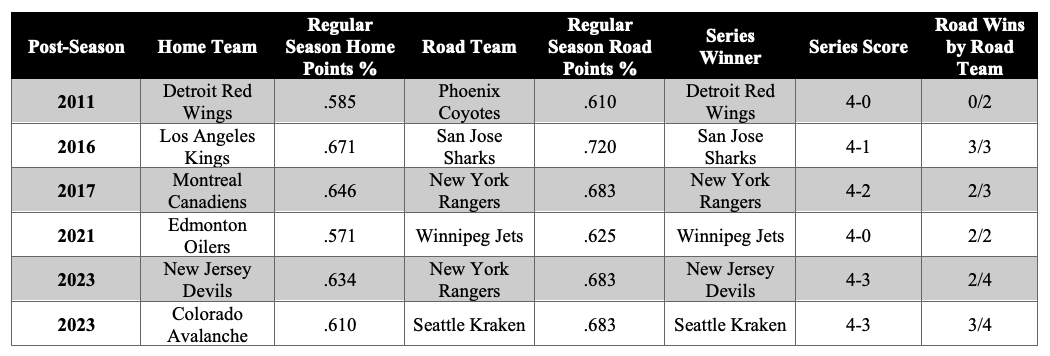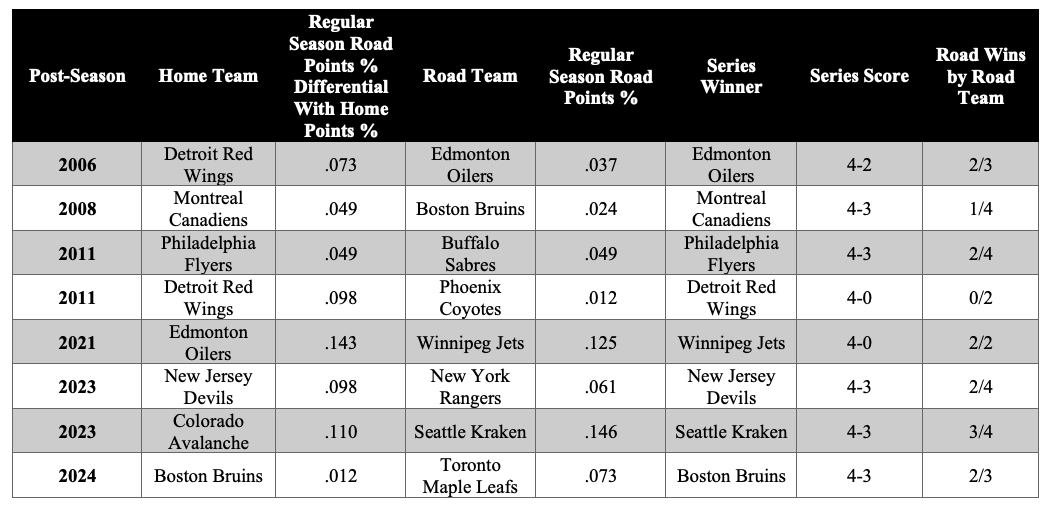How Regular Season Home and Road Records Correlate With the First Round of the Stanley Cup Playoffs
As previously discussed in the Slapshot Bets’ article “Why NHL Teams Play Better at Home Than on the Road”, there are explainable reasons as to why, in the long-run, teams win more than 50% of the time at home. In fact, since the 1989-1990 season, there has never been a single season where more road games were won than at home. In the first round of the Stanley Cup Playoffs, there are further variables at play, one of the biggest being that the team with more points, typically implying the better team, will usually have home-ice advantage, with the exception of some cases of lower pointed teams having home-ice advantage due to being at the top of a weaker division. The team with home-ice advantage will always play, at minimum, the same number of home games as their opponent, if not one more. Because of this, it is no surprise that in the salary cap era beginning in 2005-2006, teams with home-ice advantage in the first round have won 93 out of 152 series, or 61.2% of the time. However, what happens when a team playing on the road preferred to play on the road in the regular season? Or a team playing at home did not play as well at home in the regular season? These are questions that will be looked at in this article to determine if a teams’ preferred venue (at home versus on the road) impacts their first round series of the Stanley Cup Playoffs. In order to get as many samples as possible, points percentage at home and on the road will be analyzed instead of win percentage, as this reduces the more common issue of teams having equal home and road wins.
Scenario 1: Road Team Has a Better Points % on the Road Than Home Team Does at Home
The first scenario essentially flips the perception of who is the better team by looking solely at home and road points percentage. If team A has home-ice advantage and team B is on the road, but team B plays better on the road than team A does at home, then there becomes the creation of “road-ice advantage”. The issue with this, however, is that this scenario is quite rare, not only because teams generally play better at home, but also because a team with home-ice advantage will typically have more points, making it more unlikely for a team with less points to have more points gathered on the road than the better team at home. As a result, there have only been six instances among 152 series where this criteria was met. Although four out of the six road teams won, the sample size is far too small to actually make a meaningful conclusion.
Instances of home-ice advantage teams having a worse record at home compared to the road record of the non-home-ice advantage team
Scenario 2: Both Teams Prefer to Play on the Road
This second scenario is similar to the first, only that this time it is simply that both the home and road team has a better regular season road record, theoretically giving an edge to the road team. Unfortunately, just like in the first scenario, it is not common to see pairs of teams having better road records, again relating back to the fact that teams generally win more at home. Because of this, there have only been eight out of 152 series where both teams had better road records than their home records. While this is once again too small of a sample size to properly gauge a correlation, what is surprising is the fact that the home team won five out of these eight instances, helping disprove any theories that regular season home and road records translate into the playoffs.
Instances of both teams having better records on the road than at home
Home Team Plays Better at Home and Road Team Plays Better on the Road
In this third scenario, both teams theoretically get what they want, where the team with home-ice advantage has a better record at home than on the road, while simultaneously, the road team has a better road record compared to their home record. This scenario is much more common than the previous two, and as a result, has a higher sample size. Since 2005-2006, there have been 24 instances of this event, of which the home team won 17 times, or 70.8% of the time. Similar to scenario two, this result is slightly surprising, as 70.8% of home-ice advantage winners well exceeds the total benchmark of 61.2%, despite the fact that these are of series where the road team preferred to play on the road in the regular season. This once again helps to disprove any assumptions that home and road records translate significantly into the playoffs.
Both Teams Play Better at Home
The final scenario is the most common one, and is in line with what is expected, where both teams have better records at home compared to the road. This event occurred 92 out of 152 times, where the team with home-ice advantage won 54 times, for a win rate for 58.7%. What makes this surprising is the fact that this scenario should theoretically be the most egregiously favoured towards the team with home-ice advantage, when in reality, home teams win at a rate of 58.7%, which is lower than the total benchmark of 61.2%.
Conclusion
After analyzing different scenarios among 152 first round Stanley Cup Playoff series since 2005-2006, six series had the road team with a better road record than the home team’s home record, of which four road teams won; eight series (some overlapping with the previous six) had both teams with a better road record, of which the home team won five times; 24 series had both the home team and road teams playing in their preferred environments, of which the home team won 17 series (70.8%); 92 series had both teams with a better home record, of which the home team won 54 times (58.7%); and some remaining series were omitted from the analysis, as either one team had an identical points percentage at home and on the road, or the home team had a better road record and the road team had a better home record. Among all 152 first round series, the home team won 61.2% of the time. Despite the small sample sizes for road teams with a better road record than the home teams’ home record, and scenarios where both teams prefer to play on the road, it can be concluded that regular season home and road records make no significant impact on post-season home-ice advantage. This is especially true when considering the largest sample, where both teams prefer to play at home, which should theoretically have the most lopsided winning percentage in favour of the team with home-ice advantage, yet this scenario had a home-ice advantage team win rate lower than the benchmark of all first round series combined. However, when looking at road points percentage on its own, the team with a better road points percentage, regardless of who has home-ice advantage, won 65.9% of first round series (in this case excluding 2013, 2019-2020, and 2021 due to unusual circumstances). This could be due to the fact that being more successful on the road implies the ability to win on a tighter schedule, when fatigued, playing slightly injured, etc. Because of this, road points percentage may be a significant predictor variable, however, this is a slightly different example when compared to the scenarios above.
One of last years’ post-season related articles on Slapshot Bets “Does Season Series Translate to Predictable Playoff Winners?” found more convincing results on regular season variables translating to post-season predictability, with the caveat being that season series should still not be used on its own. However, it appears that home and road records have an even lower significance, and should even be avoided when using a multivariable regression model to predict first round winners.
For further guidance on predictions related to the first round of the 2025 Stanley Cup Playoffs, subscribe below and stay tuned for the release of the 2025 First Round Prediction Analysis, which will be available on the products page at the end of the regular season.


